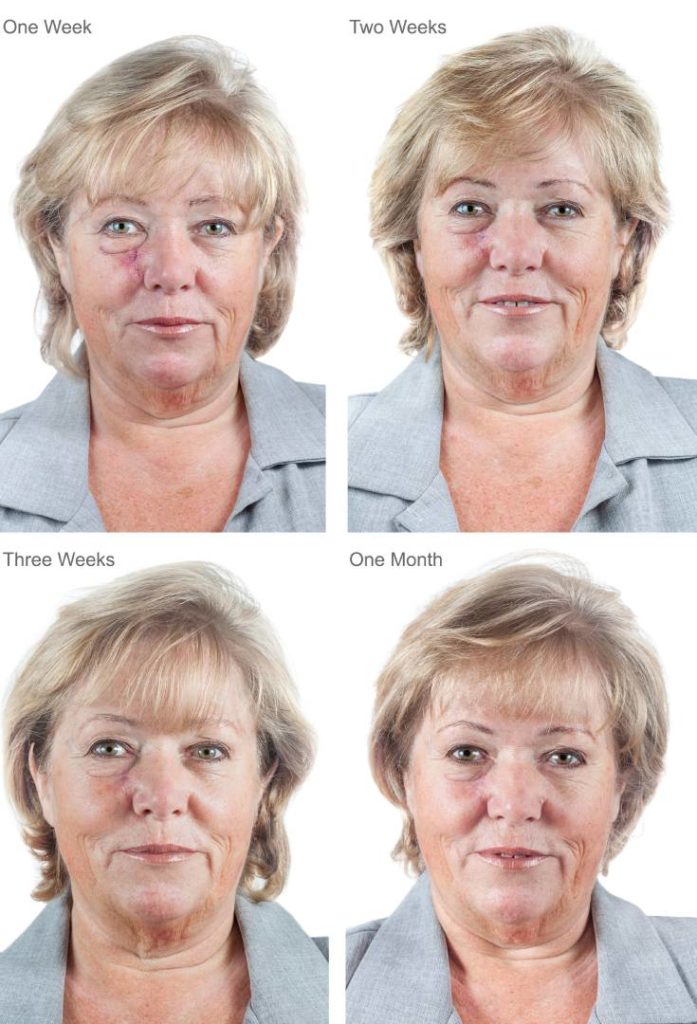An estimated 20 percent of adults will develop skin cancer at some point during their lives. Treatment for this form of cancer has historically involved noticeable scarring, particularly for those whose skin cancer extends over a large surface area. If skin cancer develops in a cosmetically sensitive area like the face, the possibility of post-treatment scarring often becomes a concern for patients who are understandably worried about changes to their appearance after the removal of cancer. Patients may be concerned about scarring, the size and depth remaining post-Mohs, or have other concerns. When reconstruction is needed, dermatologists often partner with skilled, board-certified plastic surgeons to improve the outcomes of their patients.
What is MOHS surgery?
Innovative MOHS micrographic surgery, or simply Mohs surgery, has become the gold standard of treatment for certain skin cancers. This outpatient procedure results in minimal downtime and scarring. It is effective for most types of skin cancer.
After you have undergone MOHS surgery, you may be advised to undergo reconstructive surgery to restore form and function. This kind of reconstructive plastic surgery can be performed following the removal of any skin cancer lesions. Patients often wonder who should be performing such a reconstruction: their original Mohs surgeon or an experienced, board-certified plastic surgeon such as Dr. Haque? The answer is usually determined in a collaborative manner between the plastic surgeon and the MOHS surgeon based on the patient’s needs.
Your Skin Cancer Reconstructive Surgery Consultation
If you have been considering undergoing reconstructive surgery following your MOHS surgery, your next step is contacting Queen City Plastic Surgery to schedule a convenient consultation in Charlotte, NC.
During your consultation, Dr. Haque will learn of your treatment goals and go over your medical history to decide if you would make a good candidate for reconstructive surgery. Some questions that you may be asked include:
- What are your treatment goals and expectations?
- Describe your medical history and lifestyle. Are you a smoker? Are you taking any prescription medications or herbal supplements? Have you previously undergone surgery?
Your consultation is a great opportunity to share your questions and concerns so that you can make an informed decision about your treatment options. You may find it helpful to write down your questions beforehand so that you don’t forget anything.
Your Reconstructive Surgery
Reconstruction is customized for each patient. There is no standard procedure for performing MOHS reconstructive surgery, as surgical sites, amount of tissue removed, and tissue types vary from patient to patient. If your procedure was a basic excision, the process is relatively straightforward. In the case of more complicated MOHS surgery, you have a number of treatment options to repair the post-procedure defect.
- Primary closure: The wound is sealed using stitches.
- A skin flap from a neighboring area can be used to cover the wound.
- The wound can be covered using a skin graft from another area of the body. The donor skin will be taken from a less prominent location, such as from behind an ear.
No matter what technique is used, Dr. Haque will make every possible effort to scar. You will be able to return home after your surgery, once you have received postoperative instructions.
Schedule Your Consultation
Are you considering post-MOHS reconstructive surgery? Do you have any remaining questions or concerns? If so, please contact the offices of Queen City Plastic Surgery at 704-372-5685 or use our secure online form to request a consultation with Dr. Haque.

